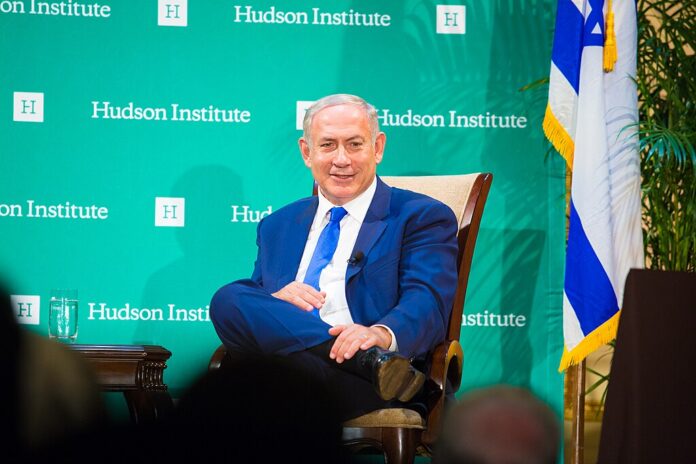Israeli Prime Minister Benjamin Netanyahu dismisses calls for a cease-fire with Hamas as protests erupt in Israel and the UK suspends arms sales to Israel over humanitarian concerns
Israeli Prime Minister Benjamin Netanyahu stood firm against international and domestic pressures to agree to a cease-fire with Hamas, despite mounting protests and increasing global criticism. Speaking after a dramatic escalation in violence and public unrest, Netanyahu maintained his position on the conflict, rejecting demands for an immediate halt to hostilities and addressing recent developments in the ongoing war in Gaza.
The crisis intensified following the recent killing of six Israeli hostages, including Israeli-American Hersh Goldberg-Polin. Netanyahu, in a late-night televised address, expressed profound regret for not being able to rescue the hostages alive, stating, “I ask for your forgiveness for not bringing them back alive.” The hostages’ bodies were discovered by the Israeli military in a Hamas tunnel over the weekend. Netanyahu vowed that Hamas would “pay a very heavy price” for their deaths.
Embed from Getty ImagesThe situation worsened when Hamas released distressing videos of the slain hostages, including Ori Danino and Eden Yerushalmi, further inflaming public sentiment and adding pressure on Netanyahu’s government. The Israeli Prime Minister’s insistence on maintaining control of the Philadelphi Corridor—a strategic strip of land along the Gaza-Egypt border—has been a sticking point in cease-fire negotiations. Hamas demands a complete Israeli withdrawal from the area, a condition Netanyahu has yet to meet.
Public outcry has been significant, with tens of thousands of Israelis protesting over the weekend, demanding an end to the war and the release of the 101 remaining hostages, about 35 of whom are feared dead. Protesters accused Netanyahu of exacerbating the national crisis for personal political gain, with one demonstrator telling CBS News, “He’s ruining the country. Divides us in order to keep his control.”
Adding to the international pressure, U.S. President Joe Biden expressed dissatisfaction with Netanyahu’s handling of the cease-fire negotiations. During a meeting with negotiators from Egypt and Qatar, Biden stated that Netanyahu’s efforts were insufficient, intensifying the diplomatic strain.
In a significant move, the British government announced it would suspend some of its arms exports to Israel. Citing concerns about a “clear risk” that the weapons could be used in violation of international humanitarian law, the UK decided to halt 30 out of approximately 350 licenses for military items currently in use in the conflict. British Foreign Secretary David Lammy emphasized that while the UK supports Israel’s right to self-defense, it must adhere to international law.
Netanyahu condemned the UK’s decision as “shameful” and “misguided,” viewing it as an unjustified interference in Israel’s security needs. Meanwhile, in Gaza, the fighting persisted as the World Health Organization (WHO) launched an urgent campaign to vaccinate children against polio. The Gaza Health Ministry reported that around 160,000 Palestinian children had been vaccinated in the first two days of the emergency campaign, highlighting the dire humanitarian conditions amid ongoing conflict.
Analysis:
Political: Netanyahu’s refusal to agree to a cease-fire reflects the complex political landscape surrounding the Israeli-Palestinian conflict. His stance underscores the delicate balance between national security concerns and international diplomatic pressures. The recent protests and global criticisms, particularly from the UK, illustrate the intense scrutiny Israel faces on the world stage. The Prime Minister’s rejection of cease-fire demands and the ongoing military actions impact both domestic politics and international relations, affecting Israel’s diplomatic and strategic positioning.
Social: The domestic protests in Israel demonstrate the growing frustration among the Israeli populace regarding the prolonged conflict and its management. The demand for a cease-fire and the release of hostages highlights the social divide over the war’s conduct and its human cost. Public sentiment is increasingly polarized, with widespread calls for peace contrasting with government policies that prioritize military objectives. The emotional response to the killing of hostages and the subsequent release of their videos by Hamas has intensified public outcry, reflecting deep social and humanitarian concerns.
Racial: The conflict’s racial and ethnic dimensions are evident in the responses from various communities. The Israeli government’s policies and actions in Gaza impact not only the Palestinian population but also influence perceptions and reactions from various ethnic and racial groups worldwide. The support for Israel from some quarters and criticism from others reflect the racial and ethnic complexities of the conflict, affecting international discourse and shaping global solidarity movements.
Gender: Gender considerations, though less prominent in the current context, play a role in the broader discourse around the conflict. Women and children are often disproportionately affected by the violence and displacement caused by the war. The impact on female hostages and the role of women in both the protest movements and humanitarian efforts underscore the gendered dimensions of conflict and recovery.
Economic: The UK’s suspension of arms exports to Israel highlights the economic implications of international arms trade and its impact on conflict zones. The restriction of military supplies can influence Israel’s operational capabilities and economic stability. The broader economic impact includes potential shifts in defence spending and international trade relationships, as well as the costs associated with managing prolonged conflict and its humanitarian consequences.
